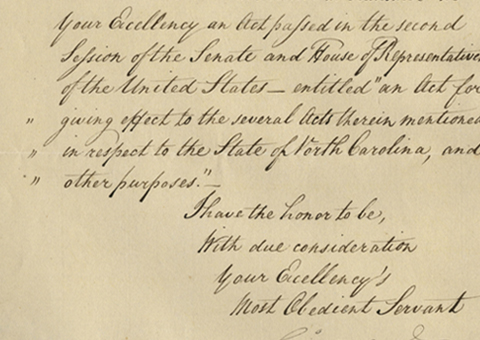Abigail Adams Poetically Writes Julia Stockton Rush About the Strong and Warm Ties Between Their Families, Which Included Three Signers of the Declaration of Independence


From One Founding Mother to Another: Perhaps the only letter from the noted correspondence of two of America’s foremost women of their day in private hands.
“I…shall never cease but with my last breath, to respect and esteem every branch of a family endeared to me by a thousand recollections of solace, comfort and smile, administered by the medical hand of tenderness and friendship…”
Dr. Benjamin Rush was one of the nation’s most noted physicians of his day...
“I…shall never cease but with my last breath, to respect and esteem every branch of a family endeared to me by a thousand recollections of solace, comfort and smile, administered by the medical hand of tenderness and friendship…”
Dr. Benjamin Rush was one of the nation’s most noted physicians of his day and had a major impact on the emerging medical profession. He was also an enthusiastic supporter of the American Revolution, and signed the Declaration of Independence. Later he advocated and voted for Pennsylvania's ratification of the U.S. Constitution. On January 11, 1776, Rush married Julia Stockton, daughter of Richard Stockton, another signer.
The Rush family was close friends with John and Abigail Adams and their family, going back to the lunches the two men had together in 1776. The Rushes were also on warm terms with Thomas Jefferson. Deeply troubled by the political and personal estrangement between Adams and Jefferson, Dr. Rush had a dream in 1809 that the two men were reconciled, and immediately set about trying to make that happen. A failure at first, his strategy of urging reconciliation on both men succeeded spectacularly when in 1812 Adams and Jefferson resumed their friendship and commenced a correspondence that both found delightful and satisfying.
From 1813 until her death in 1818, Abigail Adams carried on a correspondence with Julia Rush. Their letters are wonderful and evocative, and show both the warmth and savvy of two of America’s most prominent women of their day. The letters can be read at founders.archives.gov, but we cannot find any record of any of them having reached the private market.
Benjamin and Julia Rush had a son Richard, who served as Attorney General to Presidents Madison and Monroe, and Secretary of the Treasury throughout the administration of John Quincy Adams. In 1828, Rush ran for vice president on Adams’ ticket, but they lost the election to Andrew Jackson. John and Abigail Adams had a daughter Abigail "Nabby" Adams who married Col. William S. Smith, and died in 1813; and also a granddaughter Caroline by Nabby who married John Peter De Windt.
Autograph letter signed, Quincy, June 9th, 1817, to Mrs. Rush, effusive about the warm ties between the families, and perhaps the sole letter from the Abigail Adams-Julia Rush correspondence in private hands. In it, Adams references her daughter and granddaughter, as well as Julia’s son Richard. “I received a letter this morning from my granddaughter Mrs. De Windt (the only daughter of my late son [in-law] and daughter Col. & Mrs. Smith). She writes to me that she is going with her husband to make a visit to your city, and is desirous of paying her respects to the friend of her grandparents and parents. I am happy that it gives me an opportunity of introducing her, and of receiving my inquiries after your health, and the welfare of your family. Although I do not hear directly from you, I hear from the Attorney General your son that you are well. I have received from him many kind tokens of friendship and have introduced to him several of my acquaintances, all of whom speak highly of him and his amiable lady. Indeed I feel a regard for him bordering on maternal affection, and shall never cease but with my last breath, to respect and esteem every branch of a family endeared to me by a thousand recollections of solace, comfort and smile, administered by the medical hand of tenderness and friendship…Your friend, Abigail Adams.”
Letters of Abigail Adams have became very uncommon.

Frame, Display, Preserve
Each frame is custom constructed, using only proper museum archival materials. This includes:The finest frames, tailored to match the document you have chosen. These can period style, antiqued, gilded, wood, etc. Fabric mats, including silk and satin, as well as museum mat board with hand painted bevels. Attachment of the document to the matting to ensure its protection. This "hinging" is done according to archival standards. Protective "glass," or Tru Vue Optium Acrylic glazing, which is shatter resistant, 99% UV protective, and anti-reflective. You benefit from our decades of experience in designing and creating beautiful, compelling, and protective framed historical documents.
Learn more about our Framing Services



































































































